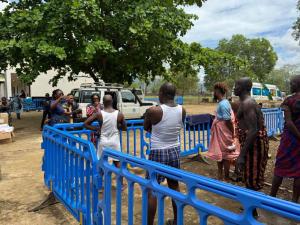Mpox patients helping to drive awareness in Sierra Leone
Freetown, Sierra Leone - While Sierra Leone is stepping up its mpox response effort, the stories behind the outbreak highlight the virus’s impact and the determination of those affected to protect themselves and their communities.
Osman Kamara is a health worker currently receiving care at the Hastings Treatment Centre, one of the facilities designated for mpox case management. He has been at the centre for eight days. He recalls the sudden onset of symptoms fever, back pain, and painful swelling in the genital area that led him to seek medical attention.
“I believe I may have been exposed during a recent social event,” he says. “People need to understand how serious this virus can be. The symptoms are painful, and it spreads more easily than many realise.”
Not far from Osman, Fanta Jalloh has been under treatment at the same facility for two weeks and is now recovering. “The care I’ve received here has helped me a lot,” she says. “I am feeling better and hope to go home soon. But we need more support so that everyone going through this can get the treatment they need.”
Osman and Fanta shared their experiences during a recent visit by the World Health Organization (WHO) team. The team is supporting the Ministry of Health and Sanitation to scale up response efforts, including patient care, surveillance, risk communication, and psychosocial support.
For many patients, recovery is both physical and emotional. Being isolated from family and community can take a toll. WHO teams continue to work with partners to ensure that those affected receive both medical treatment and the psychological support they need.
Moved by their own experiences, both Osman and Fanta have expressed a strong desire to help others understand the disease and prevent its spread. “Once I am discharged, I want to talk to people about what this illness is really like,” says Fanta. “We can’t fight it with silence or fear; we need to share information.”
Stories like theirs highlight the critical role of early diagnosis, access to quality care, and strong community engagement. As the outbreak continues, WHO remains committed to working with the government and partners to strengthen the national response and ensure that facilities like the Hastings Treatment Centre are equipped to deliver life-saving care.
In the face of this dreadful disease, patients like Osman and Fanta are becoming powerful voices for change and helping to raise awareness, reduce stigma, and build trust within their communities.
Emergencies Communications Officer
WHO Africa Regional Office
nwonyec [at] who.int (nwonyec[at]who[dot]int)
+2348034645524
WHO Sierra Leone
Email: sharkahm [at] who.int (sharkahm[at]who[dot]int)



